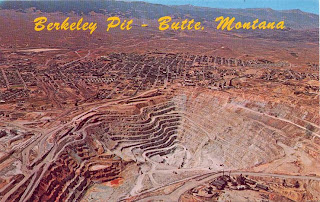If you ever happen to find yourself on
the campus of Montana Tech, in Butte, and your eyes happen to wander
to the east, your gaze will be greeted by a stunning scenic display.
Historic gallows frames from the old mining days dot the foreground,
while the hillside behind them appears as artistic horizontal bands
of orange, red, yellow, and brown. I know of at least one artist who
made that hillside the subject of a rather pretty series of oil
paintings.
That hillside, of course, is the
Berkley Pit: America's biggest superfund site and once known as “the
richest hill on earth.” Those beautiful bands of color are the end
result of environmental pillaging on an almost unimaginable scale;
the lovely hues that paint the terraced hillside come from over a
century of mining waste and pollution. The richest hill on earth has
become its foulest pit, but from a distance it looks sorta pretty.
If you get a little closer, down inside of it, say, the view isn't
nearly so pleasant.
This is by way of making a point about
perspective, description and knowledge. The perspective from which
one views the world has necessary consequences on one's description
of the world. One's description of the world dictates which facts
about the world one can become aware of, and which facts one cannot
(because they fall outside of one's description). Any economist
necessarily views the economy from a particular perch within the
economic system which s/he is describing. The location of this perch
is an over-determining factor in the economist's economic thinking
and outlook. It largely determines which phenomena they see as
problematic and which as salutary, which problems they consider
relatively minor, to be safely ignored, and which need immediate
addressing.
Most of those whose occupations consist
of describing the economy and its functioning occupy perches that
are, at the very least, situated well within the top half of the
income distribution. Even relatively low-paid adjunct professors, if
not especially affluent, are at least part of the white-collar,
professional world. This uniformity of perspective has important
effects on economic theory and knowledge. It is as if economists
were trying to describe the Berkley Pit, but never venturing any
closer to it than the Montana Tech campus. This is not to imply that
there is nothing important that one might discover from that
perspective, but rather to point out that many important aspects of
reality are simply not accessible from that vantage point.
In the same way, economists whose
entire experience of the labor market consists of holding one or
another academic post, can hardly be expected to have much to
contribute to discussions about the low-wage service sector. From
behind a desk in the ivory tower the psychological suffering faced by
“the working poor” on a daily basis probably doesn't seem like
such a big deal. For a tenured academic, it might be difficult to
understand the psychic toll that a lifetime of having little-to-no
control over one's work takes on a person. There is knowledge about
the workings of our economy, vital, relevant knowledge, that is
simply “invisible” to most economists because they've only seen
the view from the hilltop, not from the valley.
In order to overcome this blindness,
economists need to learn to listen to people who occupy other perches
in our economy, especially perches below their own. We would have
very different economic policy prescriptions if economists spent less
time in the tower and more time in the street, examining those things
which aren't visible from the faculty lounge.

1 comment:
Diptherio-
You commented on my earlier post "Ominous Parallels: What Antebellum America Can teach Us About our Modern Political Regime." I thought you might be interested in an addition I wrote earlier today:
The Rule of Law and the Ruling Class in American History
Post a Comment